Country Profiles
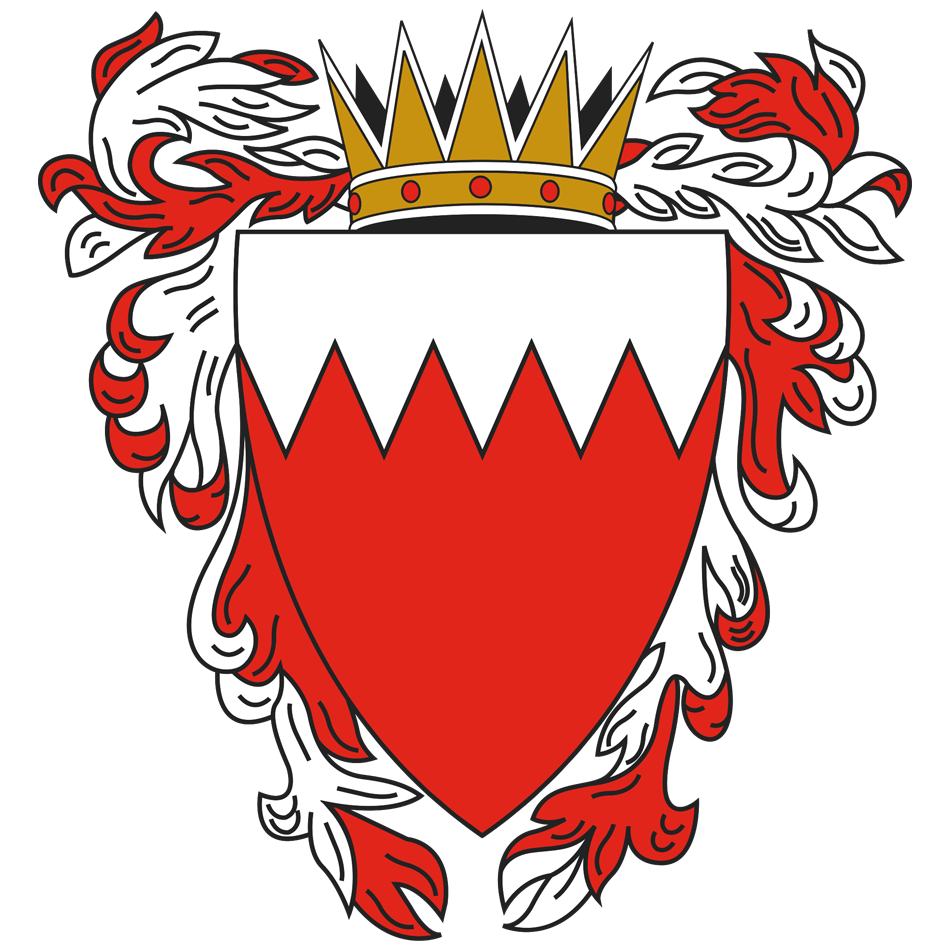 |
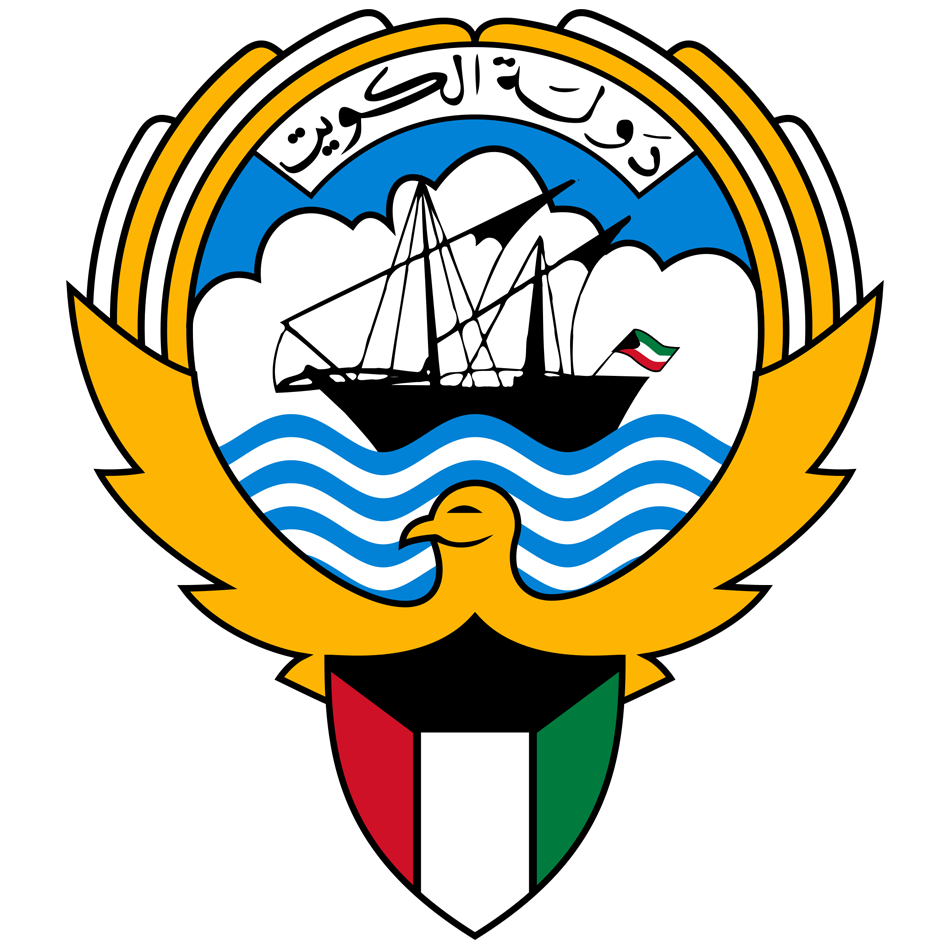 |
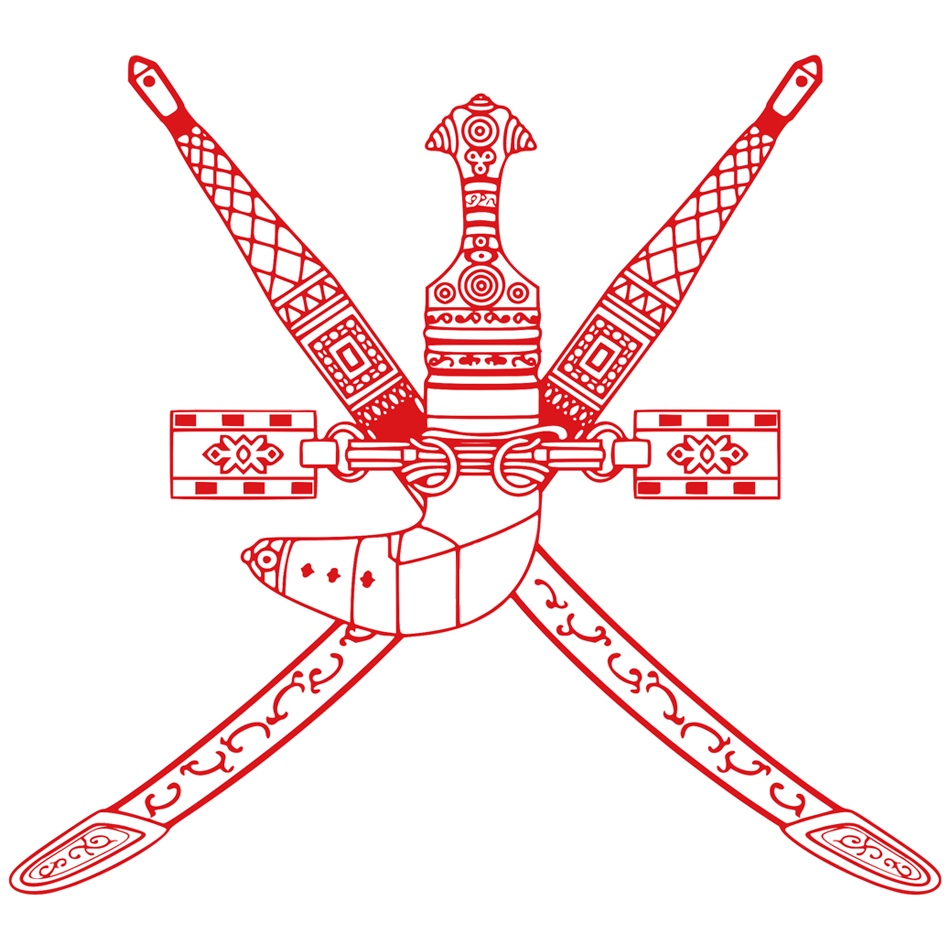 |
 |
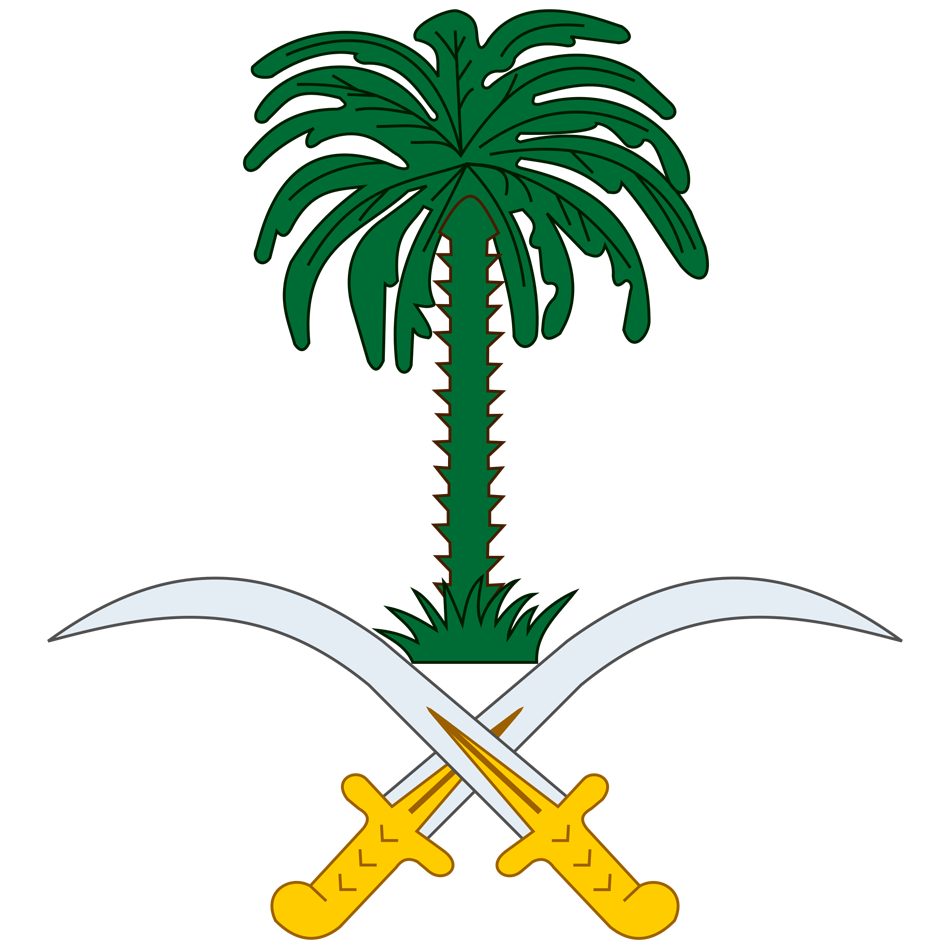 |
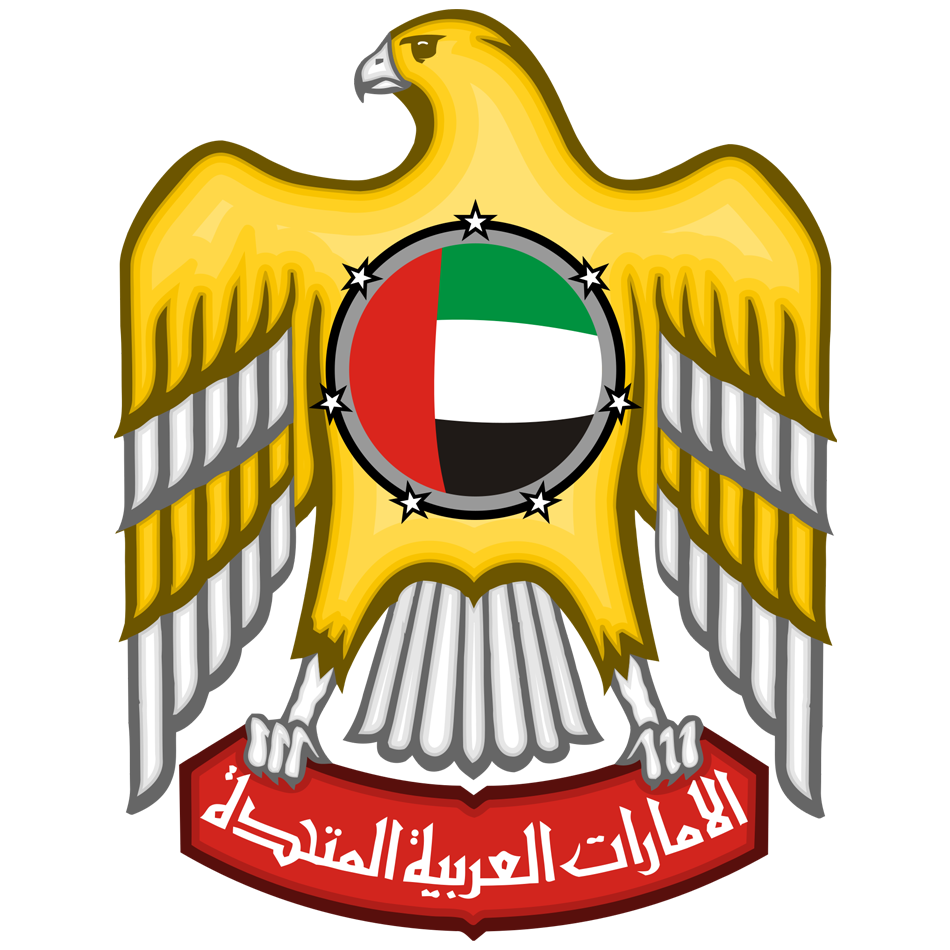 |
Kuwait
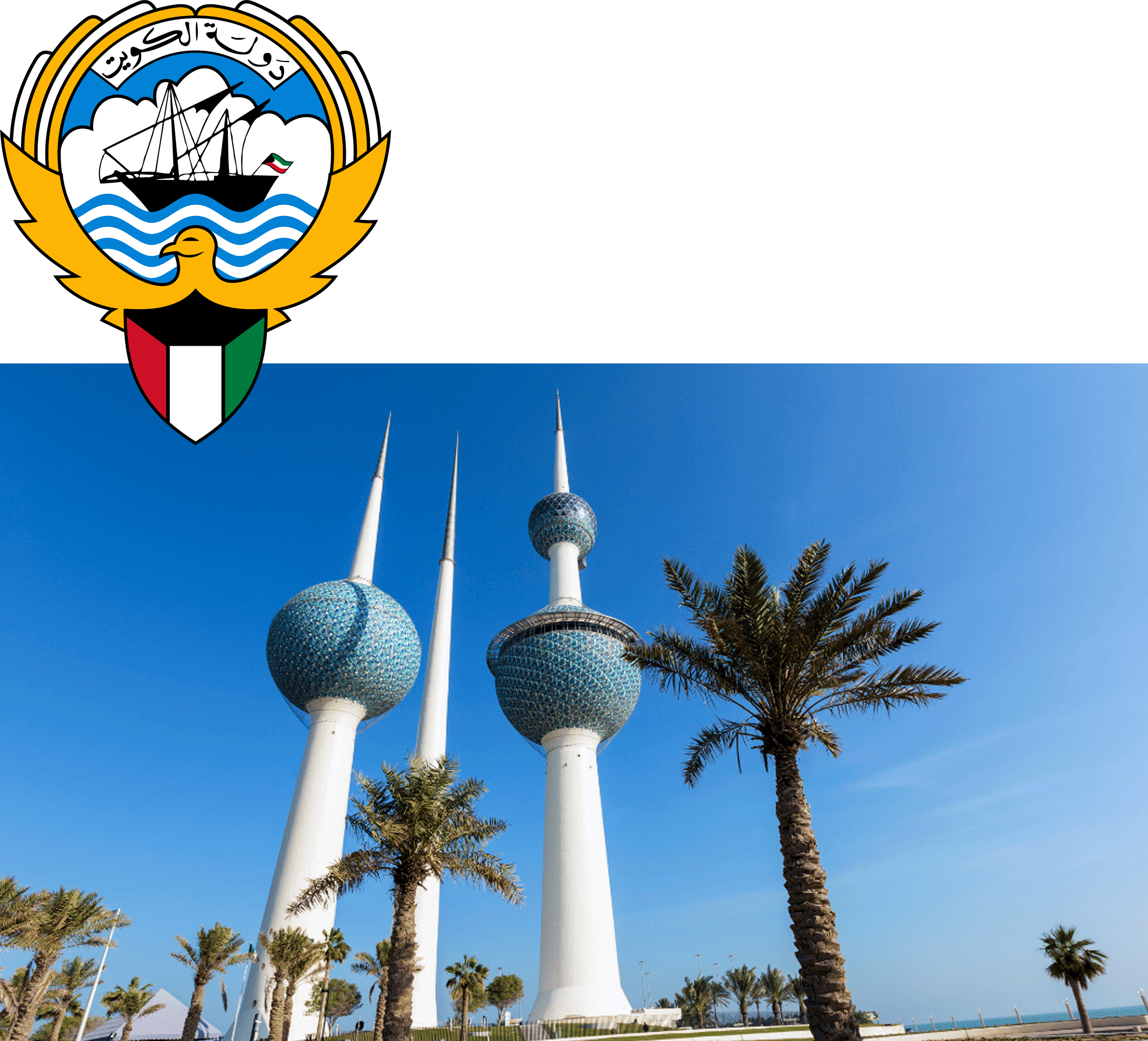
Kuwait is situated in the northern edge of the Arabian Peninsula at the tip of the Persian Gulf, bordering Iraq to the north and Saudi Arabia to the south. With a coastline of approximately 311 miles, Kuwait also shares a maritime border with Iran.
Maps & Flag
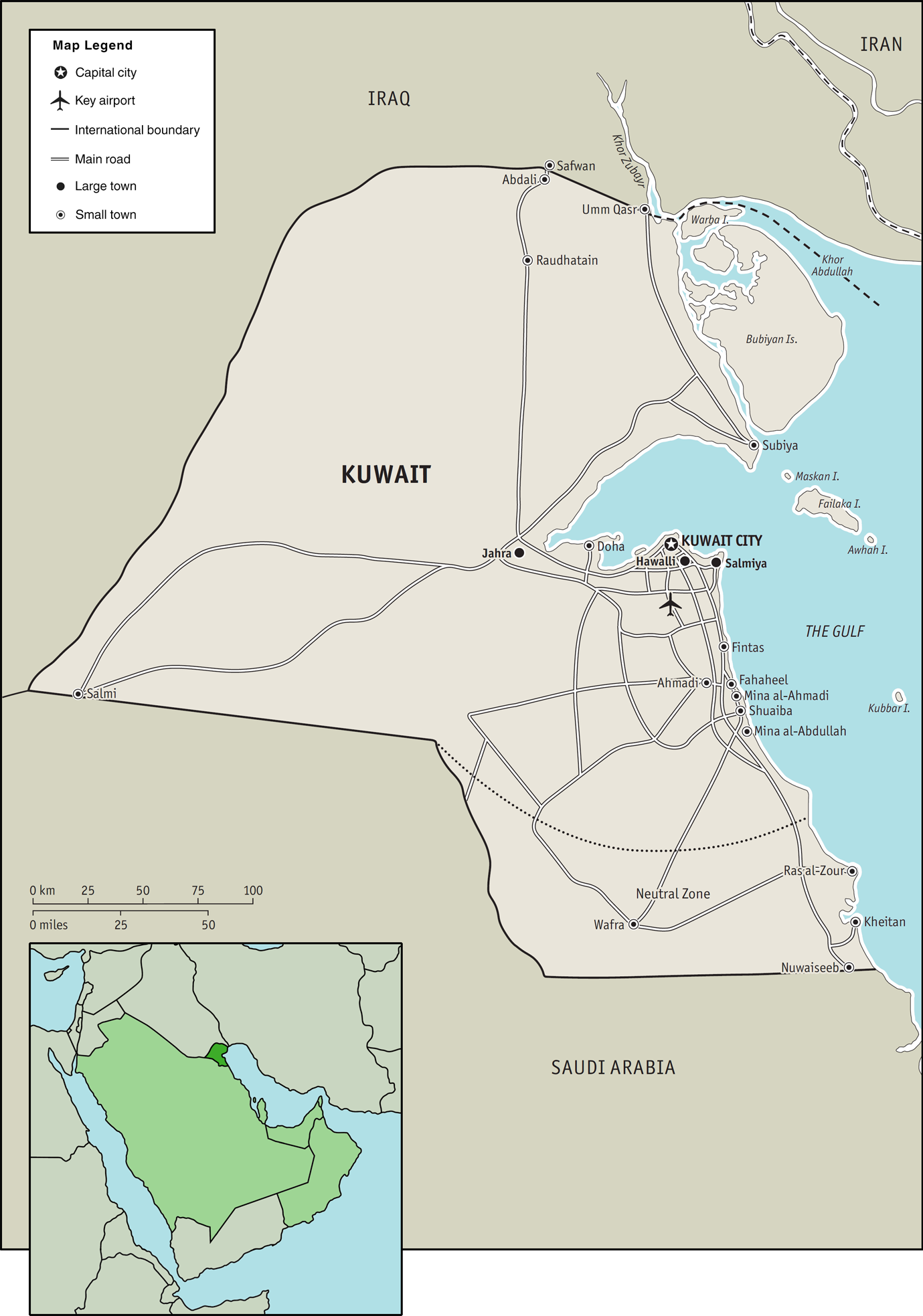
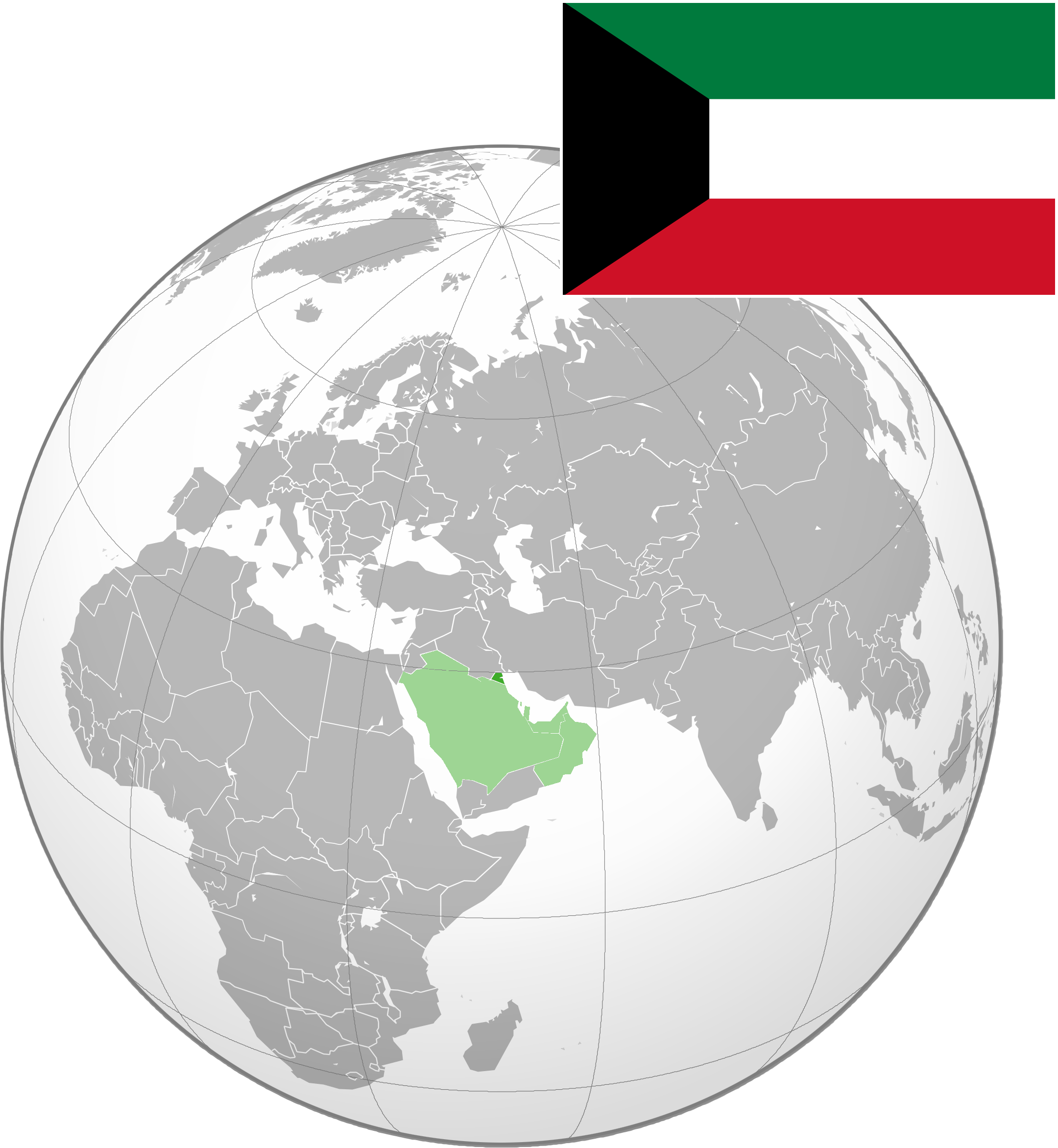
Most of Kuwait’s population reside in the urban agglomeration of Kuwait City, the capital city. As of 2024, had a population of 4.91 million, of which 1.54 million were Kuwaiti citizens; the remaining 3.36 million were foreign nationals from a multitude of countries.
Introduction
Kuwait’s long-term economic outlook remains heavily reliant on hydrocarbon revenues. While the Kuwait Investment Authority’s (KIA) substantial foreign assets safeguard macroeconomic stability, they are insufficient to fully mitigate the impact of global oil market volatility and the expected decline in long-term oil demand. As the World Bank (2024a) sum up the current economic situation:
As one of the world’s smallest yet richest countries, a comprehensive fiscal and economic reform is necessary to support sustainable growth and address structural challenges. With oil and gas comprising over 90 per cent of exports and government revenue, Kuwait’s economy is lagging in diversification and foreign direct investment (FDI) attraction. A further moderation in economic activity is anticipated in 2024, with stabilisation expected over the medium term. OPEC+ production cuts, weaker global conditions, and subdued domestic demand weigh on growth. Key risks to the outlook include global uncertainties, oil market volatility, and the ongoing political deliberations on critical reforms, where progress is anticipated
as efforts toward resolution continue.
According to the World Bank (2024a), key challenges facing Kuwait include “the risks from fluctuating oil production and prices, potential global economic slowdown, and increasing climate-related shocks.” Historically, frequent governmental changes and tensions between Kuwait’s executive and legislative branches weighed on the investment environment and hindered the reform process. With the appointment of a new government in May 2024, resolving the political gridlock will be crucial for advancing economic diversification and reform efforts. Kuwait’s government is navigating those challenges amid oil receipts fluctuations and increasing expenditures, with ongoing non-oil revenue generation playing a critical role. Prudent fiscal management remains crucial in navigating the uncertainties of the global economic environment, and in achieving a resilient and diversified economic structure. Environmental priorities, including water resource management and energy efficiency, are being addressed through investments in sustainable infrastructure and renewable energy. Although favorable oil receipts may provide short-term fiscal relief.
Political-Economy
The Economist Intelligence Unit’s 2023 Democracy Index ranks Kuwait 114th out of 167 countries and territories, a worsening of three places compared with the 2022 index (EIU, 2024). According to the UK think-tank, Kuwait’s score has deteriorated to 3.50 out of 10, from 3.83 in 2022, “driven primarily by a sharp fall in the political participation score.” Kuwait then is categorised as an “authoritarian” regime as are all other of its Arabian Gulf neighbours. That being said, the EIU do state that “Kuwait has a more open polity than most of its fellow GCC states, and ranks the highest among them as a result.” [1]
Freedom House (2024) states that Kuwait is ruled by the Sabah family by way of a constitutional monarchy. While the monarchy holds executive power and dominates most state institutions, the elected parliament plays an influential role, often challenging the government. State authorities impose some constraints on civil liberties, including speech and assembly. However, in May of 2024, Kuwait’s new Emir — Sheikh Mishal al-Ahmad al-Sabah — dissolved the country’s parliament and took over some of its duties in the weeks after the latest set of elections. According to LeBaron (2024), “hardly anyone noticed” and what followed was the royal family assuming some powers of the 50-member National Assembly. LeBaron (2024) added that the governments in the the other Arabian Gulf countries have been silent, perhaps “quietly pleased that Kuwait’s longtime experience with a parliament with some genuine power has been quashed for the moment.”
Human Rights Watch state that:
Kuwaiti authorities continue to use provisions in the constitution, the national security law, and the country’s cybercrime law to restrict free speech and prosecute dissidents, particularly focusing on comments made on social media. Kuwait is falling behind on reforming its kafala (labour sponsorship) system, which leaves migrant workers vulnerable to abuse and forced labor. The Bidoon, a community of stateless people who claim Kuwaiti nationality, remain in legal limbo while the government resorts to coercion and penalises peaceful community activism.
Graphs & Tables
What follows are a selection of graphs and tables from credible and cited sources. It is worth comparing Kuwait’s data (see below) with those of the other five Arabian Gulf countries.
Regarding Kuwait, Reporters Without Boarders (Reporters sans frontières, RSF) states that despite its reputation as the least repressive country in the Arabian Gulf, it “exercises a great deal of control over news and information, which increased at the end of the reign of Emir Sheikh Nawaf al-Ahmad al-Sabah and under the reign of his successor, Sheikh Mishal al-Ahmad al-Sabah, in 2023.” Many subjects are taboo in Kuwait. It is particularly difficult for journalists to tackle migrant worker rights, women’s rights and corruption.
Since 2020, the law on the right to access information is supposed to safeguard the work of journalists in Kuwait. But in reality, the law is thwarted by censorship laws that prohibit journalists, bloggers and online activists from criticising the government, the emir, the ruling family, its allies or religion. The same is true for the cybercrime law that took effect in January 2016. In sum, the Kuwaiti government exercises a significant degree of control over information, and freedom of expression remains limited, although many members of Kuwait’s opposition in exile were recently pardoned.
Press freedom in Kuwait
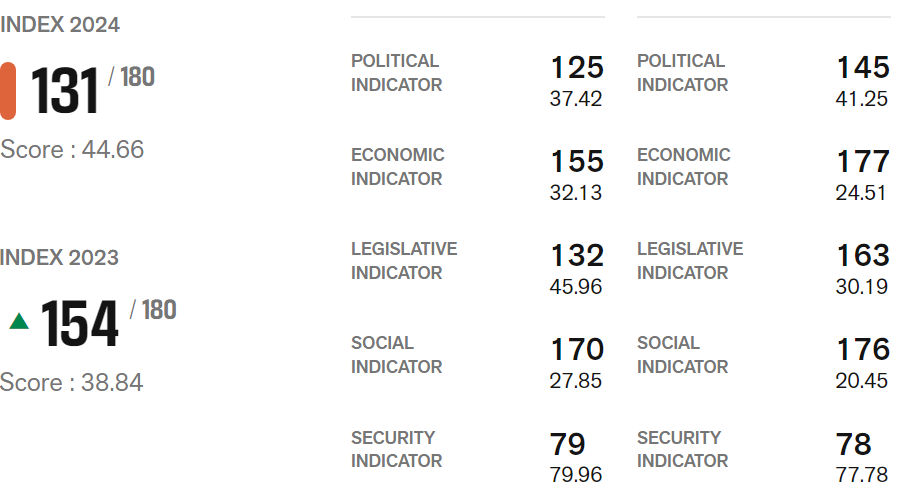
Bertelsmann Stiftung’s Transformation Index analyses the transformation processes toward democracy in transitional economies across the globe. In 2024 it was stated that throughout MENA, “autocratic rule festers” and that MENA’s scores for democracy and the quality of governance are at “all-time lows” and that “the quality of governance is deteriorating, and military forces are gaining power.” The German Non-governmental organisation adds that many countries within this region on “flashy imagery and marketing under the banner of modernisation, rather than making actual progress (BTI, 2024).
Kuwait’s 2024 BTI scores
Expand Chart →
Kuwait’s 2024 BTI matrix:
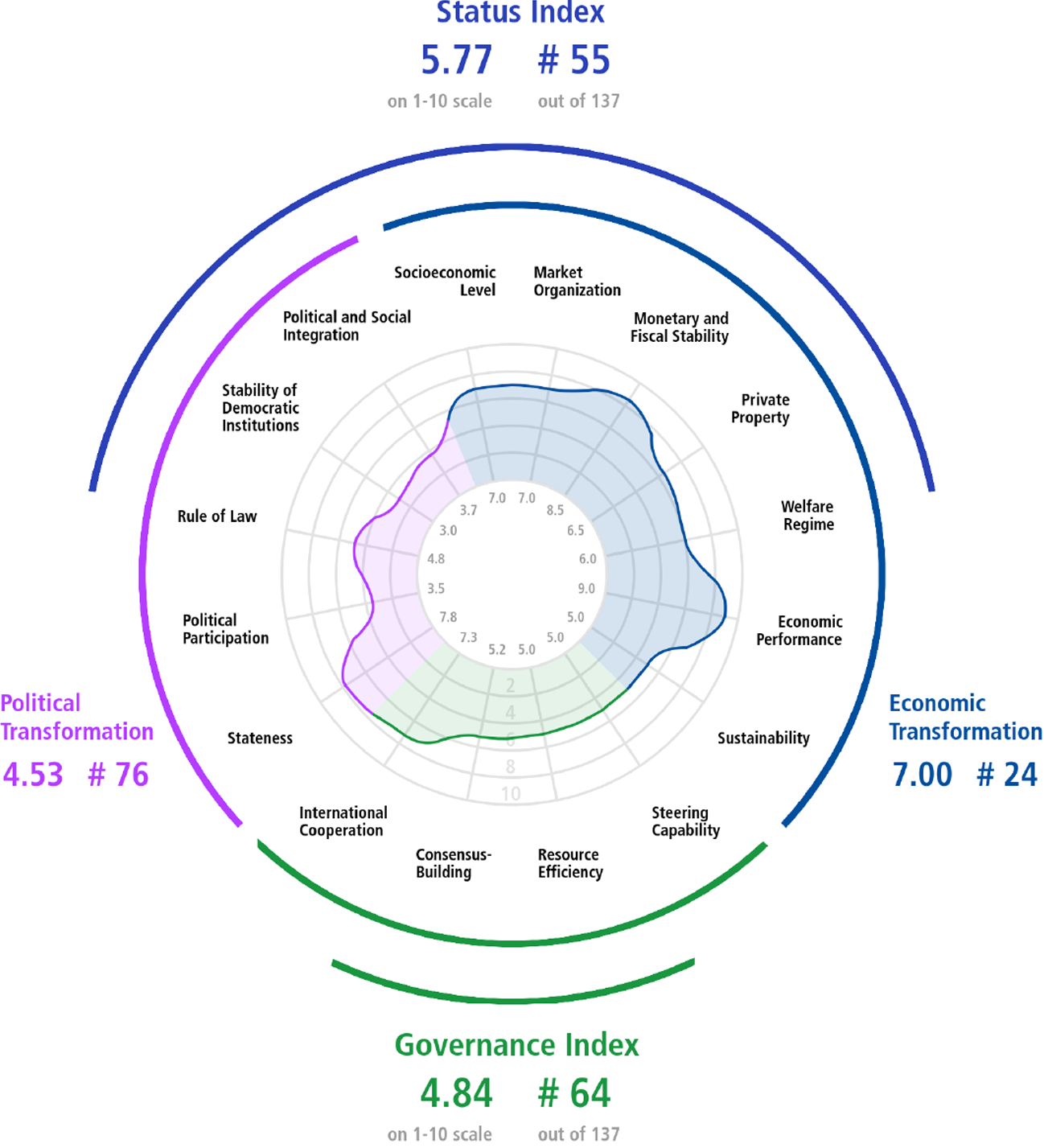
Kuwait’s 2022 BTI matrix:
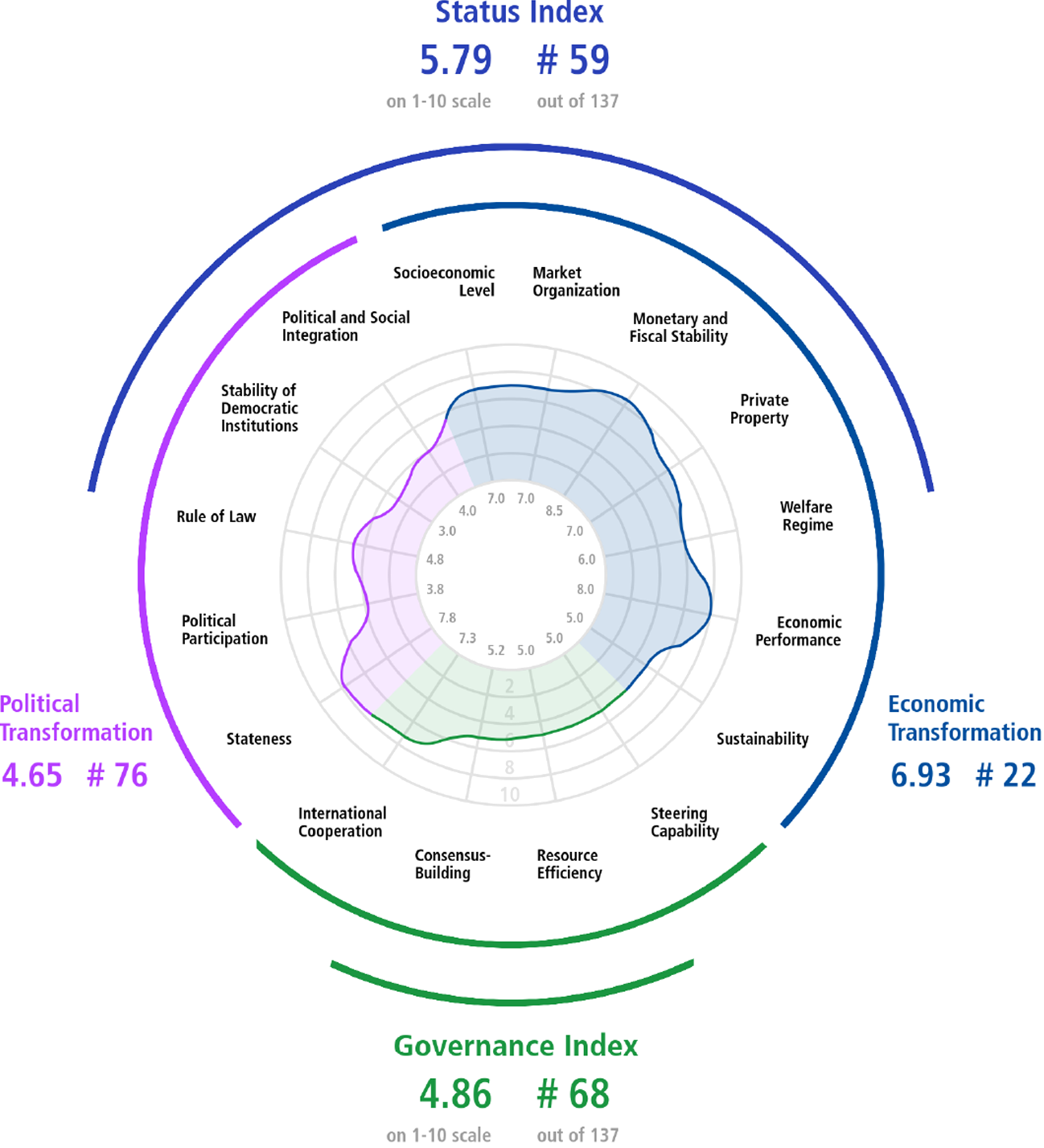
Kuwait’s 2020 BTI matrix:
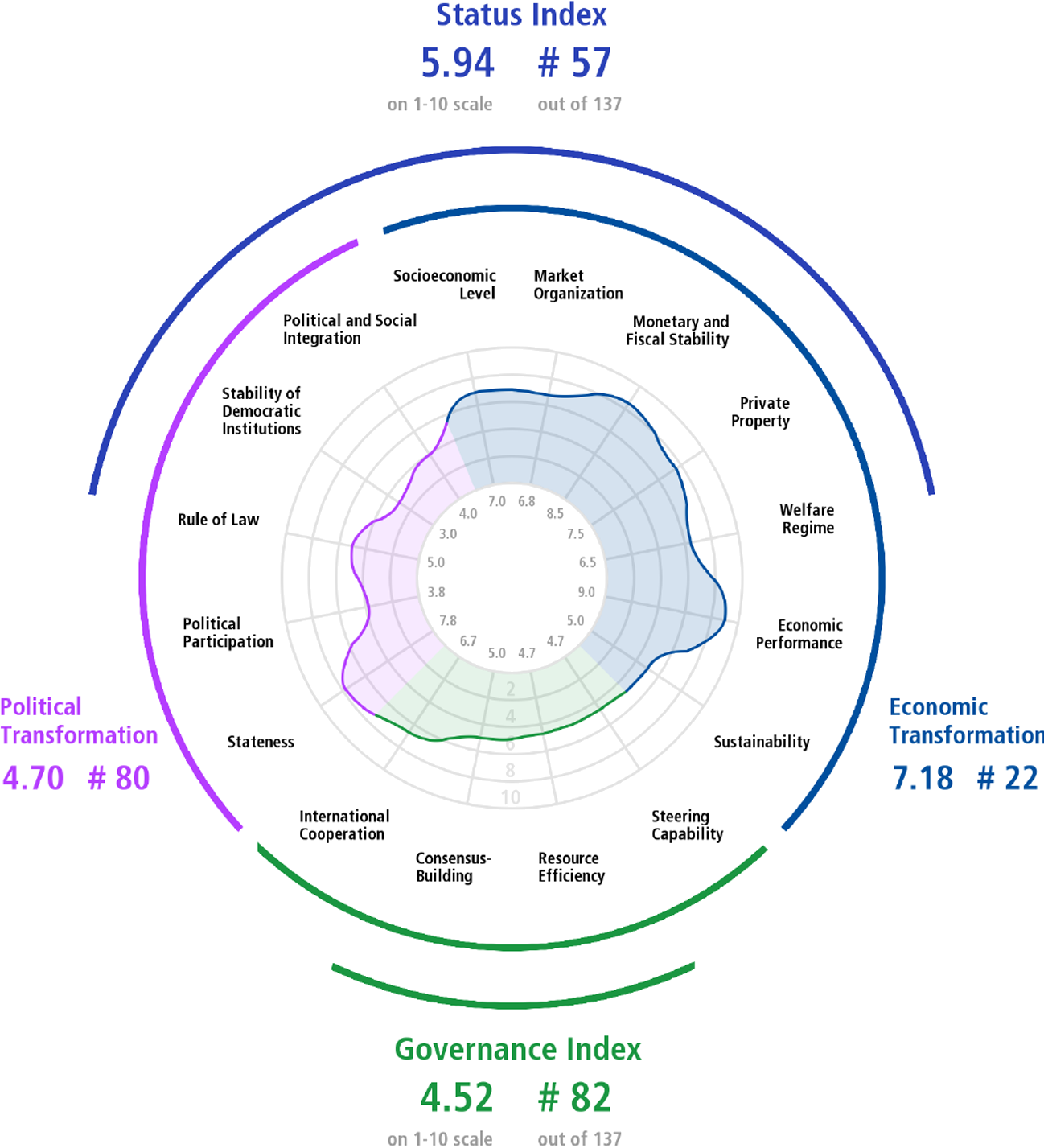
Kuwait’s 2018 BTI matrix:
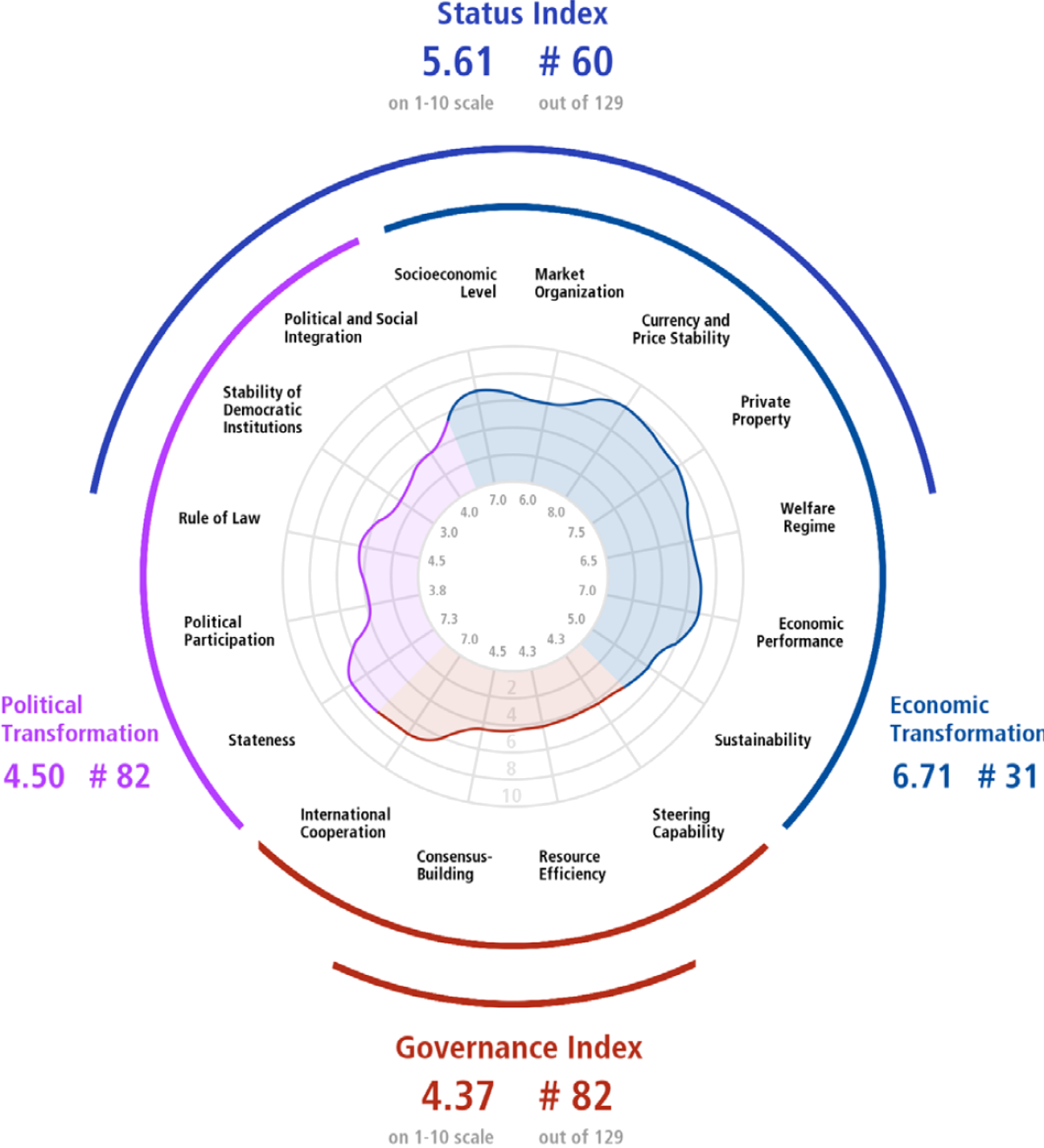
Fraser Institute rankings
The Fraser Institute’s Human Freedom Index presents a broad measure of human freedom, understood as the absence of coercive constraint.
Kuwait, Human Freedom Index, 2024 scores
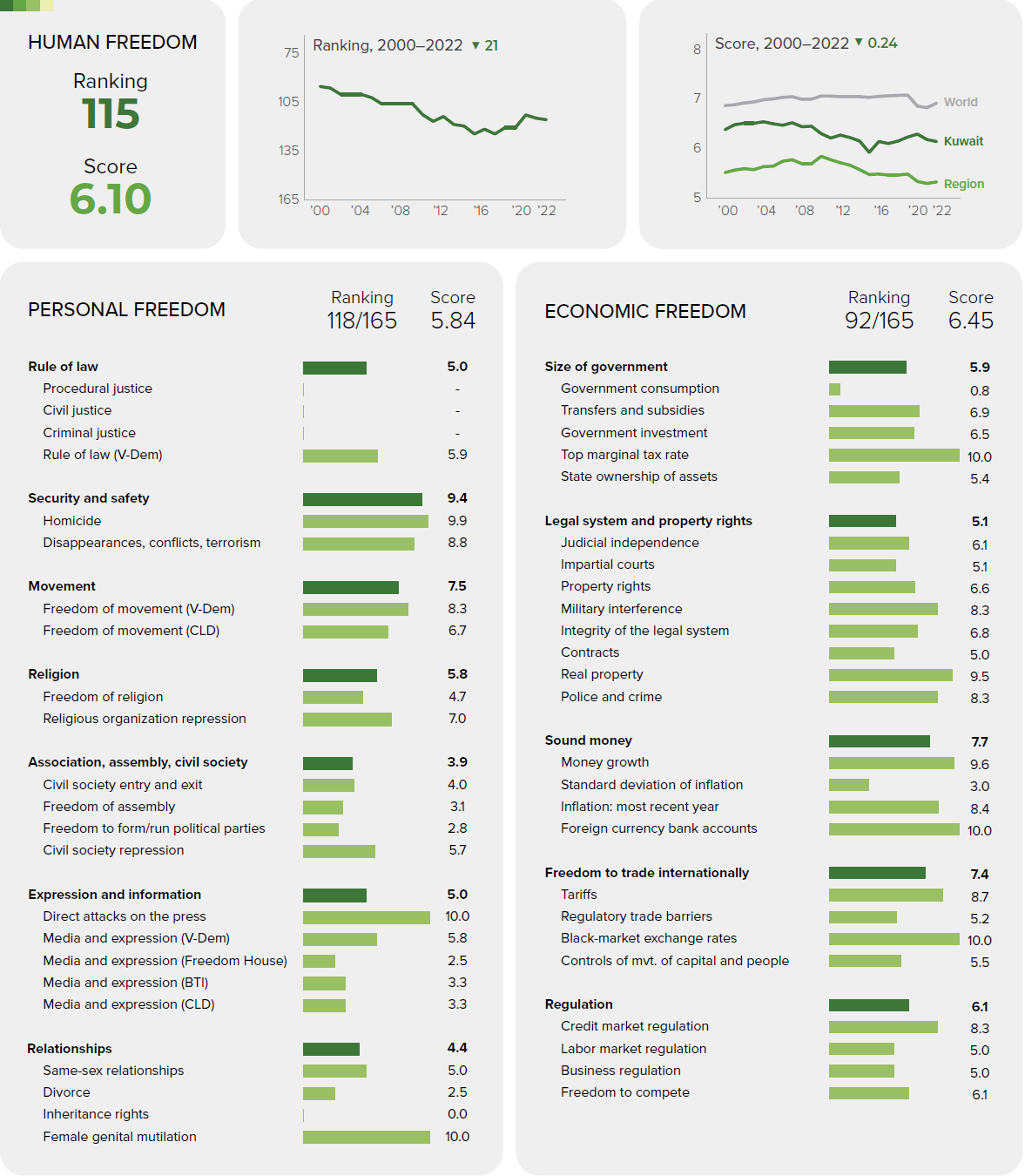
Freedom House rankings
Freedom House point out that their Freedom in the World annual rankings are “the most widely read and cited report of its kind, tracking global trends in political rights and civil liberties for over 50 years.” They chart Global Freedom scores and Internet Freedom scores for some 210 countries and territories. More latterly, Freedom House have begun to chart Internet Freedom scores (currently 70 countries are tracked, of which three are in the Arabian Gulf: Bahrain, Saudi Arabia and the United Arab Emirates).
Kuwait, Freedom in the World, 2024 scores
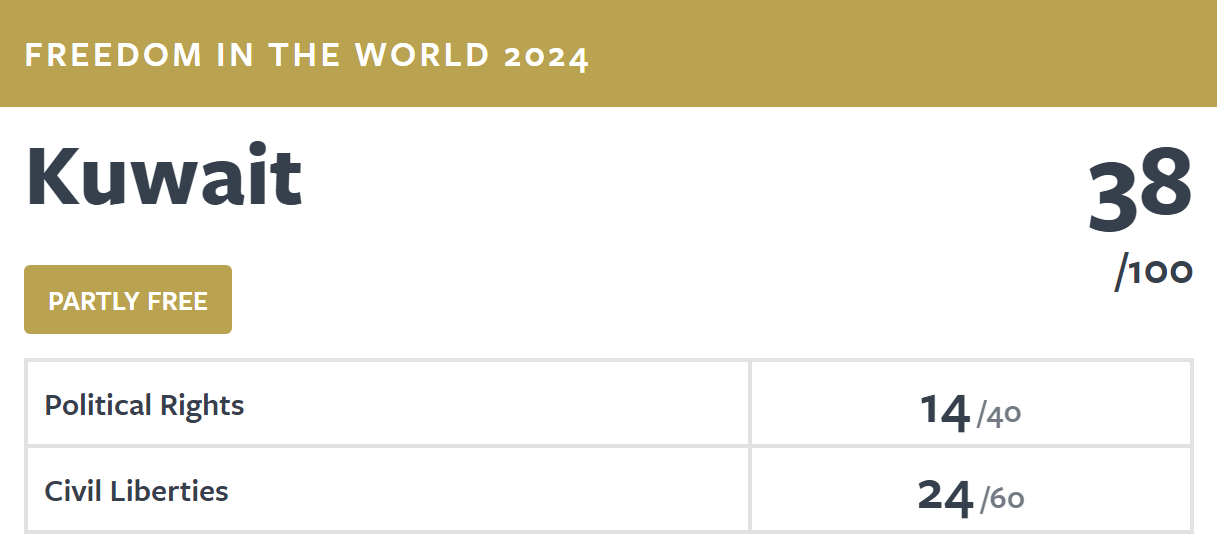
notes
Country profile information is compiled from, amongst others, the following sources; a full References list for this page is also given below:
Academic
 Cambridge University Press →
Cambridge University Press →
 Intellect Discover →
Intellect Discover →
 Oxford Academic →
Oxford Academic →
 Routledge →
Routledge →
 Sage →
Sage →
 Springer →
Springer →
Media outlets
 The Economist Intelligence Unit →
The Economist Intelligence Unit →
 Financial Times →
Financial Times →
 Middle East Economic Digest →
Middle East Economic Digest →
Organisations
 Arab Monetary Fund →
Arab Monetary Fund →
 Bertelsmann Transformation Index →
Bertelsmann Transformation Index →
 Energy Information Agency →
Energy Information Agency →
 Energy Institute →
Energy Institute →
 Eurostat →
Eurostat →
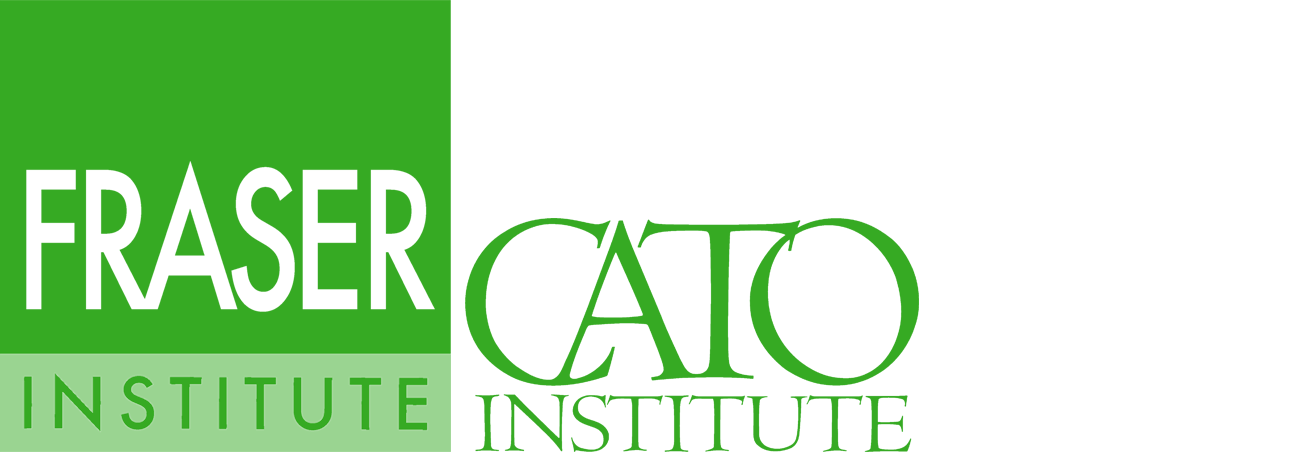 Fraser Institute →
Fraser Institute →
 Freedom House →
Freedom House →
 International Energy Agency →
International Energy Agency →
 International Monetary Fund →
International Monetary Fund →
 Organisation of Petroleum Exporting Countries →
Organisation of Petroleum Exporting Countries →
 Organisation for Economic Co-operation and Development →
Organisation for Economic Co-operation and Development →
 Reporters sans frontières →
Reporters sans frontières →
 United Nations Development Program →
United Nations Development Program →
 Varieties of Democracy →
Varieties of Democracy →
 The World Bank →
The World Bank →
 World Economic Forum →
World Economic Forum →
 World Intellectual Property Organisation →
World Intellectual Property Organisation →
 World Trade Organisation →
World Trade Organisation →
References
Al Shouk, A. (2024, June 20). Emiratisation deadline looms as larger private companies look to fulfil national targets. The National. https://www.thenationalnews.com/news/uae/2024/06/20/emiratisation-deadline-july/
Arab Monetary Fund. (2025). Economic Statistics [Dataset]. https://www.amf.org.ae/en/arabic_economic_database
Asker, J., Collard-Wexler, A., & De Loecker, J. (2017). Market power, production (mis)allocation and OPEC. National Bureau of Economic Research, Working Paper Series, 1(September, w23801), 1–54. https://doi.org/10.3386/w23801
Assidmi, L. M., & Wolgamuth, E. (2017). Uncovering the Dynamics of the Saudi Youth Unemployment Crisis. Systemic practice and action research, 30(2), 173–186. https://doi.org/10.1007/s11213-016-9389-0
Baumeister, C., & Kilian, L. (2016). Forty Years of Oil Price Fluctuations: Why the Price of Oil May Still Surprise Us. The Journal of Economic Perspectives, 30(1), 139–160. https://doi.org/10.1257/jep.30.1.139
Bekhradnia, B. (2016). International university rankings: For good or ill? Higher Education Policy Institute, 1(89), 1–32.
Benítez-Márquez, M.-D., Sánchez-Teba, E. M., Coronado-Maldonado, I., & Sung, W.-W. (2022). An alternative index to the global competitiveness index. PloS one, 17(3), 1–19. https://doi.org/10.1371/journal.pone.0265045
Bertelsmann Stiftung. (2024). BTI 2004-2024 Country Reports [Dataset: Bertelsmann Transformation Index]. https://bti-project.org/en/reports/global-dashboard
BP. (2022). Statistical Review of World Energy. British Petroleum.
Bradshaw, T. (2022). [Book Review] Davidson, C. “From Sheikhs to Sultanism: Statecraft and Authority in Saudi Arabia and the UAE”. Middle Eastern Studies, 58(1), 687–688. https://doi.org/10.1080/00263206.2021.2017288
Caldara, D., Cavallo, M., & Iacoviello, M. (2019). Oil price elasticities and oil price fluctuations. Journal of Monetary Economics, 103(May), 1–20. https://doi.org/10.1016/j.jmoneco.2018.08.004
Chirikov, I. (2023). Does conflict of interest distort global university rankings? Higher Education, 86(4), 791–808. https://doi.org/10.1007/s10734-022-00942-5
Cooley, A., & Snyder, J. (Eds.). (2015). Ranking the World: Grading States as a Tool of Global Governance. Cambridge University Press.
Cortés, P., Kasoolu, S., & Pan, C. (2023). Labor Market Nationalization Policies and Exporting Firm Outcomes: Evidence from Saudi Arabia. Economic development and cultural change, 71(4), 1397–1426. https://doi.org/10.1086/719835
EIA. (2024). International, Petroleum and other liquids [Dataset: U.S. Energy Information Administration]. https://www.eia.gov/international/data/
EIA. (2025). Real Petroleum Prices [Dataset: Energy Information Agency]. https://www.eia.gov/outlooks/steo/realprices/
EIU. (2024). Democracy Index 2023: Age of conflict. Economist Intelligence Unit. https://www.eiu.com/n/campaigns/democracy-index-2023/
EIU. (2025). EIU Democracy Indices, 2018-2023 [Dataset: EIU Democracy Indices]. Economist Intelligence Unit.
Energy Institute. (2024). Statistical Review of World Energy [Dataset]. https://www.energyinst.org/statistical-review/resources-and-data-downloads
Eurostat. (2025). Database [Dataset]. https://ec.europa.eu/eurostat/data/database
Fraser Institute. (2024). The Human Freedom Index. The Fraser Institute.
Freedom House. (2024a). Freedom on the Net [Dataset]. https://freedomhouse.org/countries/freedom-net/scores
Freedom House. (2024b). World Freedom Index [Dataset]. https://freedomhouse.org/report/freedom-world#Data
Global Media Insight. (2024). UAE Population 2024 (Key Statistics). Global Media Insight. https://www.globalmediainsight.com/blog/uae-population-statistics/
Global SWF. (2024). Countries Ranking [Dataset]. https://globalswf.com/countries
Government of Bahrain. (2024). The National Labour Market Plan 2023-2026. Labour Market Regulatory Authority.
Government of Bahrain. (2025). Open Data Portal [Dataset]. Information & eGovernment Authority. https://www.data.gov.bh/
Government of Dubai. (2022). Number of Population Estimated by Nationality [Dataset]. https://www.dsc.gov.ae/en-us/Themes/Pages/Population-and-Vital-Statistics.aspx?Theme=42
Government of Kuwait. (2018). Decent Work: Country Programme For Kuwait. Government of Kuwait.
Government of Kuwait. (2024). Labour Market Statistics [Dataset: Central Statistical Bureau]. https://www.csb.gov.kw/Pages/Statistics_en?ID=64&ParentCatID=1
Government of Kuwait. (2025). Open Data [Dataset]. https://e.gov.kw/sites/kgoenglish/Pages/OtherTopics/OpenData.aspx
Government of Oman. (2022). Skills needs in the Oman labour market: An employer survey. Oman Chamber of Commerce and Industry.
Government of Oman. (2025). Population statistics [Dataset: National Centre For Statistics & Information]. https://data.gov.om/
Government of Qatar. (2025). Open Data Portal [Dataset: Planning and Statistics Authority]. https://www.data.gov.qa
Government of Saudi Arabia. (2024). Labour Market Statistics [Dataset: General Authority for Statistics]. https://www.stats.gov.sa/en/814
Government of the United Arab Emirates. (2025). Open Data [Dataset]. Ministry of Economy. https://www.moec.gov.ae/en/open-data
Gulf Research Centre. (2024). Gulf Labour Markets, Migration and Population programme [Dataset]. https://gulfmigration.grc.net/
Gunitsky, S. (2015, June 23). How do you measure ‘democracy’? The Washington Post. https://www.washingtonpost.com/news/monkey-cage/wp/2015/06/23/how-do-you-measure-democracy/
Hazelkorn, E. (2019). University Rankings: there is room for error and “malpractice”. Elephant in the Lab. https://doi.org/10.5281/zenodo.2592196
Herre, B. (2024). Democracy data: how sources differ and when to use which one. OurWorldinData.org. https://ourworldindata.org/democracies-measurement
Hertog, S. (2018). Can we Saudize the labour market without damaging the private sector? Retrieved from http://eprints.lse.ac.uk/id/eprint/101471
Hertog, S. (2024). The Political Economy of Reforms under Vision 2030. In J. Sfakianakis (Ed.), The Economy of Saudi Arabia in the 21st Century: Prospects and Realities (pp. 359–380). Oxford University Press.
IEA. (2025). Data and statistics [Dataset: The International Energy Agency]. https://www.iea.org/data-and-statistics/data-sets
Ikenberry, G. J. (2015). Ranking the World: Grading States as a Tool of Global Governance [Book Review]. Foreign Affairs, 94(5), 180–180. https://www.jstor.org/stable/24483753
IMF. (2023). Kuwait: 2023 Article IV Consultation. IMF Staff Country Reports, 2023(331). https://doi.org/10.5089/9798400254680.002
IMF. (2024a). Gulf Cooperation Council: Pursuing Visions Amid Geopolitical Turbulence. International Monetary Fund working papers, 2024(66), 1–74. https://doi.org/10.5089/9798400295744.007
IMF. (2024b). Qatar: 2023 Article IV Consultation. IMF Country Report, 2024(24/43). https://www.imf.org/en/Publications/CR/Issues/2024/02/06/Qatar-2023-Article-IV-Consultation-Press-Release-and-Staff-Report-544471
IMF. (2024c). Saudi Arabia: 2024 Article IV Consultation. IMF Staff Country Reports, 2024(323). https://doi.org/10.5089/9798400252099.002
IMF. (2024d). United Arab Emirates: 2024 Article IV Consultation. IMF Staff Country Reports, 2024(325). https://doi.org/10.5089/9798400293245.002
IMF. (2024e). World Economic Outlook [Dataset]. https://www.imf.org/en/Publications/WEO/weo-database/2024/April
IMF. (2025). Oman: 2024 Article IV Consultation. IMF Staff Country Reports, 2025(13). https://doi.org/10.5089/9798400298318.002
Kashyap, A. K., & Kovrijnykh, N. (2016). Who Should Pay for Credit Ratings and How? The Review of financial studies, 29(2), 420–456. https://doi.org/10.1093/rfs/hhv127
LeBaron, R. (2024, May 20). Parliament was dissolved in Kuwait and hardly anyone noticed. Atlantic Council. https://www.atlanticcouncil.org/blogs/menasource/parliament-kuwait-sabah-democracy/
Lopesciolo, M., Muhaj, D., & Pan, C. (2021). The quest for increased Saudization: Labor market outcomes and the shadow price of workforce nationalisation policies. Retrieved from https://growthlab.hks.harvard.edu/publications/quest-increased-saudization-labor-market-outcomes-and-shadow-price-workforce
Nair, D. (2024, May 13). What roles are Emiratis being hired for in the private sector? The National. https://www.thenationalnews.com/business/money/2024/05/13/emiratis-hired/
OECD. (2025). OECD Data Explorer [Dataset]. https://www.oecd.org/en/data/datasets/oecd-DE.html
OPEC. (2024). Annual Statistical Bulletin. Organisation of the Petroleum Exporting Countries.
Polity IV. (2018). Political Regime Characteristics and Transitions, 1800–2018 [Dataset: Center for Systemic Peace]. http://www.systemicpeace.org/inscr/p4v2018.xls
Poplavskaya, A., Karabchuk, T., & Shomotova, A. (2023). Unemployment Challenge and Labor Market Participation of Arab Gulf Youth: A Case Study of the UAE. In M. M. Rahman & A. Al-Azm (Eds.), Social Change in the Gulf Region: Multidisciplinary Perspectives (pp. 511–529). Springer Nature Singapore.
Porter, M. E. (1998). Competitive Advantage of Nations. Simon & Schuster.
Reporters Without Borders. (2024). Press Freedom Index [Dataset: Press Freedom Index]. https://rsf.org/en/index
Rutledge, E. J., & Al Kaabi, K. (2023). ‘Private sector’ Emiratisation: social stigma’s impact on continuance intentions. Human Resource Development International, 26(5), 603–626. https://10.1080/13678868.2023.2182097
Shore, C. (2018). How Corrupt Are Universities? Audit Culture, Fraud Prevention, and the Big Four Accountancy Firms. Current Anthropology, 59(18), 92–104. https://doi.org/10.1086/695833
The Economist. (2020, May 7). Credit-rating agencies are back under the spotlight. The Economist. Retrieved from https://www.economist.com/finance-and-economics/2020/05/07/credit-rating-agencies-are-back-under-the-spotlight
The Times of Kuwait. (2024, August 24). Kuwaiti workforce grows to 457,567. The Times of Kuwait. https://timeskuwait.com/kuwaiti-workforce-grows-to-457567-makes-up-21-3-of-labor-market/
UNDP. (2024). Human Development Index [Dataset: The United Nations Development Program]. https://hdr.undp.org/data-center
UNDP. (2025). Human Development Index (HDI). The United Nations Development Program. https://hdr.undp.org/data-center/human-development-index#/indicies/HDI
V-Dem. (2024). V-Dem [Dataset: University of Gothenburg, Department of Political Science]. https://doi.org/10.23696/mcwt-fr58
Vaccaro, A. (2021). Comparing measures of democracy: statistical properties, convergence, and interchangeability. European political science, 20(4), 666–684. https://doi.org/10.1057/s41304-021-00328-8
WEF. (2019). The Global Competitiveness Indices. The World Economic Forum. https://www3.weforum.org/docs/WEF_TheGlobalCompetitivenessReport2019.pdf
WEF. (2025). The Global Competitiveness Indices, 2008–2019 [Dataset: Global Competitiveness Indices]. The World Economic Forum. https://www.weforum.org/publications/series/
WIPO. (2024). Global Innovation Index [Dataset: UN, The World Intellectual Property Organisation]. https://www.wipo.int/en/web/global-innovation-index
World Bank. (2024a). Macro Poverty Outlook [Dataset]. http://documents.worldbank.org/curated/en/099345310142441749/
World Bank. (2024b). Worldwide Governance Indicators [Dataset]. https://www.worldbank.org/content/dam/sites/govindicators/
World Bank. (2025a). World Development Indicators [Dataset]. https://data.worldbank.org/
World Bank. (2025b). Worldwide Governance Indicators – Data Sources. https://www.worldbank.org/en/publication/worldwide-governance-indicators/
WTO. (2025). WTO Stats [Dataset: World Trade Organisation]. https://stats.wto.org/dashboard/merchandise_en.html
The Six GCC Economies:
 |
 |
 |
 |
 |
 |
| i | This is the website of Dr Emilie J. Rutledge who, with almost two decades’ worth of experience in managing, designing and delivering university-level economics courses, is currently Head of the Economics Department at The Open University.
 erutledge.com  Dr Emilie J. Rutledge Emilie has published over 20 peer-reviewed papers and is the author of “Monetary Union in the Gulf.” Her current research focus is on employability, the feasibility of universal basic incomes and, the oil-rich Arabian Gulf’s economic diversification and labour market reform strategies. On an ad hoc basis, Emilie provides consultancy on developing interactive university courses, alongside analytical insight on the political-economy of the Arabian Gulf. |

 Elsevier
Elsevier